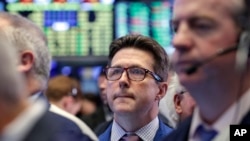The major averages traded lower Friday in a week of directionless activity as traders digested a weaker-than-expected employment report and crude oil prices pulled back. Utilities, financials and health care were the only sectors in the green.
The September jobs report showed employment growth eased for the third straight month, and the unemployment ticked up 0.1 percent. Even though the report was slightly weaker than expected, traders are still pricing in a 64 percent chance that the Federal Reserve will hike interest rates at the December meeting, according to the CME Group's Fed Watch tool.
Pound pounded
The British pound plunged as much as 6.1 percent in early Asian trading Friday. It was the biggest decline since the U.K.'s Brexit referendum result was announced and hit a fresh 31-year low.
The Financial Times reported that French President Francois Hollande said the U.K. must suffer the consequences of leaving the EU in order to save the trading bloc from an existential crisis. Also, the sterling has been under pressure since Prime Minister Theresa May's speech Sunday, as she is said to take the view that financial services would get no special favors in EU exit talks.
"Since Brexit, the British pound has been under severe downward pressure. The fundamental backdrop is clear, and investors are clearly worried about the economic ramifications of the historic vote," said Adam Sarhan, CEO of Sarhan Capital. "When examining price charts, the pound continues to trigger technical sell signals and gets weaker by the day. Extreme moves in major currencies, like the flash crash we saw last night, typically indicate more weakness in the months ahead for the pound."
Trading week ahead
The second presidential debate will take place at 9 p.m. ET Sunday. The 90-minute debate, to be held at Washington University in St. Louis, will be hosted by Martha Raddatz and Anderson Cooper. During the last debate on September 26, U.S. stock futures and the Mexican peso rallied as it was perceived Hillary Clinton emerged as the winner.
U.S. equity markets will be open Monday for the Columbus Day holiday, but bond markets and banks will be closed.
Earnings
The unofficial start of earnings season kicks off Tuesday with Alcoa before the market opens. The only other major reports next week will come from CSX, Delta Air Lines, Wynn Resorts and several banks, including Citigroup, JPMorgan, PNC and Wells Fargo. The real heart of earnings season is the week of October 25.
According to analysts at S&P Global Market Intelligence, earnings are projected to decline 1 percent year-over-year for the fifth quarterly decline in a row. Seven of 11 S&P sectors are expected to post positive earnings growth for Q3, with materials, financials, utilities and consumer staples leading, while telecommunications, industrials and real estate may show a decline. The energy sector is again projecting the largest decline in growth, though the decline continues to improve sequentially.
Macro
On Wednesday, the Federal Open Market Committee minutes from the September meeting will be released at 2 p.m. ET. While investors do not expect a change in the minutes from the last FOMC meeting, the release could move the markets as traders pick apart each word, looking for clues to monetary policy. Three Federal Reserve Bank presidents will also be on the speaking circuit, including Chair Janet Yellen at the Boston Fed Conference on Friday.
Key economic data include: JOLTs Job Openings, Retail Sales for September and the Producer Price Index. Analysts will also be monitoring the weekly crude inventory and Baker-Hughes rig count reports to assess the oil supply glut.






